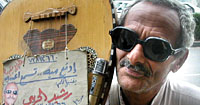
Talents, when they starve!Songs on the sidewalk [Archives:2003/662/Last Page]
August 25 2003
 |
The Yemeni artist, Rasheed al-Houraibi, is a talent in singing field. He was famous and prominent singer, however, he has been in recent seen wandering the streets carrying his lute and bearing a sign reading “Pay a hundred, listen to a song”.
Thus, he earns meager sum of money in order to survive in this merciless life. This cruel life that has badly treated many talented people, especially artists renowned in various genres of art. Some of them are neglected and fought during their life and their works rejected for various reasons, mostly intentionally. But after their death some fair and just people would remember them and appreciate their skillful works and they get honored while dead instead of while they are alive.
In Yemen there is Rasheed al-Houraibi who brings his art from the darkness of theatres and recording studios to the street light as a result of unjust conditions and reality that do not respect or pay due attention to genuine art and artists.
I purposefully approached this creative artist to know much about him and shed light on his life and the misery he is experiencing.
About his beginning, he assured that he was a star and prominent artist in the mid sixties in Aden. His songs were broadcast on radio and on TV. He also went to Abu Dhabi in UAE.
Q: How come you have decided to go on signing on streets?
A:When I came back from Abu Dhabi 1991 and applied to a job at the ministry of culture, they asked for qualifications and certificates most of which were lost and burnt. So they did not accept me.
Because of the need of money I was forced to sell everything even my lute and to sit on the pavements. Because of my bad financial situations I started singing in return for small sums of money.
Q: Are the financial conditions the only reasons behind singing on the street?
A: No, of course not. There are many other reasons forced me to go to the streets and sing to the passers-by. One of these reasons is the stand of the government to not employ me as well as stop broadcasting my recorded songs.
I did not hesitate to sing in the street because it is the only way to get money and continue living.
Q: How do people look at you when you sing on the street?
A-The audience of the street is different from the audience of theater and cassettes. So when you sing on the street, you will find different people. One admires the way of your singing the other mocks and hurt you.
Some society members behave spontaneously and some behave ignorantly. Thus, I deal with all people wisely and patiently. Some people treat me as a crazy because I sing on the street and other respect and sympathize with me.
Q: Who is your audience that listens to your songs?
A: My audience is normally from students and educated people as well as uneducated people such as workers, peddlers and jobless people. They love to taste fine art.
Q: How do you feel when you sing on the streets? And how do you look for future?
A: When I sing on the street, I feel free and independent, as there are no conditions and control when I sing. I sing when I want and stop when I don't. I also feel comfortable when I move from place to another. These are the positive things.
About future, I am optimistic and there is no place for pessimism. I do not think of being neither rich nor famous. I like simplicity. Today I have got diabetes.
Q: When will you leave the street?
A: When my financial circumstances get improved and have a secured income, having government salary or a work contract, then I will leave the street as I get tiresome with. I do not think I will leave the street in near future.
——
[archive-e:662-v:13-y:2003-d:2003-08-25-p:lastpage]


